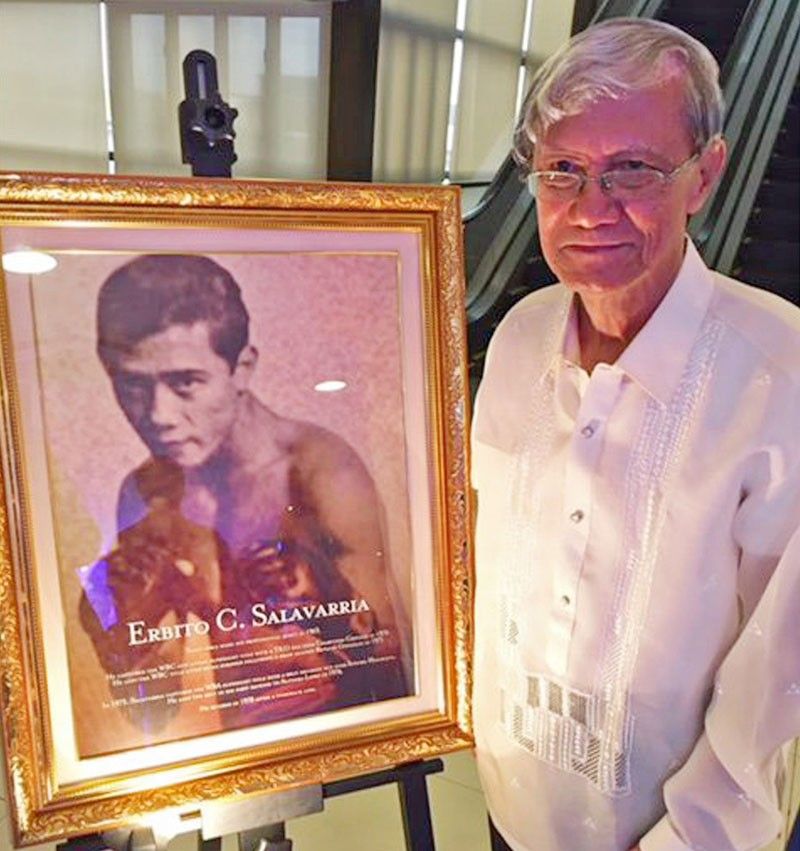Salavarria named Hall of Famer

MANILA, Philippines — Former two-time world flyweight champion Erbito Salavarria was inducted into the Philippine Sports Hall of Fame, joining nine others in the third batch of honorees, during enshrinement rites organized by the PSC as mandated by R. A. 8757 at the PICC last Thursday night.
Salavarria, 72, is the sixth fighter to be recognized after Flash Elorde, Pancho Villa, Ceferino Garcia, Cely Villanueva and Anthony Villanueva who were in the first class of 2010. No boxer was inducted in the second enshrinement in 2016.
The third batch also included Ben Arda of golf, Sen. Ambrosio Padilla and Loreto Carbonell of basketball, Boy Codinera of baseball, Paeng Nepomuceno, Bong Coo and Lita de la Rosa of bowling and Josephine de la Vina and Lydia De Vega of athletics. Nepomuceno, Coo, De Vega and Salavarria attended the ceremonies and received a trophy and a check for P100,000 each. The others were recognized posthumously.
Salavarria retired in 1978 at 32 after compiling a record of 40-11-3, with 11 KOs and performing in Los Angeles, Honolulu, Japan, Thailand, Mexico, Panama and Venezuela. His biggest purse was $75,000 for staking the WBC flyweight crown against Betulio Gonzalez in Maracaibo in 1971. Today, he lives a modest lifestyle and is self-sufficient. He receives a P3,000 monthly pension provided by Thai businessman Naris Singwancha for former Filipino world champions through GAB.
Salavarria preserved his ring earnings to take care of his family. He built a home and gym in San Francisco del Monte and once operated a fleet of five passenger jeepneys. Salavarria used to train fighters from the Elorde stable. One of his protégés Reynante Jamili went up against Manny Pacquiao and was knocked out in two rounds in 1999. Salavarria’s gym is now managed by his sons and provides a steady income. One son was an amateur fighter but never turned pro. He has six children and 17 grandchildren. Salavarria’s wife passed away of kidney complications in 2010.
Through the years, Salavarria has kept within his fighting weight and still does calisthenics for physical exercise. He watches fights on TV and admires Pacquiao. “I’ve met Sen. Manny and followed his career,” he said in Pilipino. “I know he’s turning 40 in a few weeks but I think he has a lot of years left to fight. He fights once or twice a year now so he’s able to extend his career. Another fighter whom I’m following is IBF superflyweight champion Jerwin Ancajas who’s very talented.” Salavarria won the WBC flyweight crown on a second round knockout over Thai Chartchai Chionoi in Thailand in 1970. In 1998, or 28 years later, Pacquiao won the same WBC flyweight title on an eighth round knockout over another Thai Chatchai Sasakul, also in Thailand.
Salavarria recalled that in 1971, he was unfairly accused of taking amphetamines during a fight against Gonzalez in Maracaibo. The fight was declared a split 15-round draw and Salavarria would’ve won on a split decision if only Filipino judge Rod Nazario scored it for him and not a draw. American referee Mills Lane saw it 148-147 for Salavarria and judge Emilio Lugo, 147-145 for Gonzalez. Moy Lainez, Lito Mondejar and Toti Sangalang were in Salavarria’s corner.
“In between rounds, I drank a mix of water and honey that was given to me by Johnny Villaflor, a Filipino from San Francisco,” said Salavarria. “In the middle of the fight, the bottle was confiscated. Gonzalez’ camp claimed I drank an illegal substance. I retained my world title because it was a draw. But during the WBC Convention, the decision was overturned. I was stripped of the title and Gonzalez was declared the new champion. Under today’s rules, it would’ve been declared a no-contest. GAB chairman Jun Montano protested the decision and argued against Ramon Velasquez of Mexico. Montano was the outgoing WBC president and Velasquez succeeded him. I remember that Montano came up with the three-knockdown rule for my fight against Chartchai and it was perfect timing because Chartchai went down thrice and the referee ruled an automatic knockout.”
In 1975, Salavarria claimed the WBA flyweight title on a split decision over Susumu Hanagata in Japan and retained the crown, also on a split verdict, in a rematch. The next year, Salavarria was dethroned by Panama’s Alfonso Lopez on a 15th round knockout at the Araneta Coliseum. “I felt so bad that I let our countrymen down,” recalled Salavarria. “I was exhausted and couldn’t go on. In my previous fight against Hanagata, I broke knuckles in both hands because he had such a hard head and for Lopez, I took two injections in each hand before the fight. After Lopez, I fought once more, two years later and lost by knockout in Thailand. That was the end of my career.”
- Latest
- Trending





























